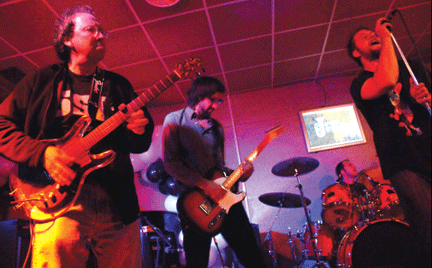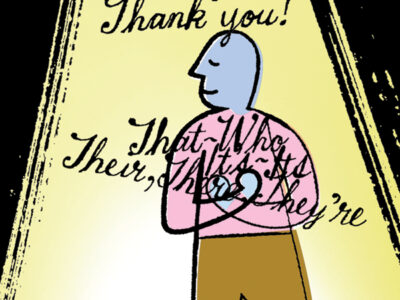
Class of ’81 | It’s hard to know just where to start with Corey Brennan C’81.
Sure, you could go back a couple of thousand years to the Roman Republic, or even back to the ancient Greeks. After all, Brennan is a serious scholar: associate professor and chair of classics at Rutgers, and currently in the middle of a three-year gig at the American Academy in Rome (AAR) as the Andrew W. Mellon Professor-in-Charge of the School of Classical Studies. In his spare time he’s been working on a book about the elite women of Republican Rome, which he describes as a sort of sequel to his massive, two-volume The Praetorship in the Roman Republic (Oxford University Press, 2001).

But if there’s such a thing as a typical classics scholar, then we’ll go out on a limb and say that Brennan is not one of them. At least, you’re not likely to find many classicists whose résumés include guitar-shredding stints with bands like the Lemonheads and, more recently, a Rome-based grunge band called Superfetazione. (In one YouTube video, the latter band is tearing it up in a venue that looks like a CIA extraordinary-rendition chamber. “Corey Brennan from Lemonheads plays in his Roman side project Superfetazione,” reads one comment. “Corey Brennan is the head of my Classics department at Rutgers University,” says another. “This is fantastic, he’s so calm and demure in person!”)
Nor will you find many classics scholars who will digress at length on the musical connection between the Greek bouzouki and surf music. (“The single most brilliant example of re-branding was taking bouzouki music and calling it surf music,” he says.) But we’re getting ahead of ourselves, which is easy to do with the kinetic Brennan.
By the time he got to Penn in the fall of 1977, Brennan already had four years of Latin and three of Greek under his belt, courtesy of the Jesuit Scranton Preparatory School. His first week at Penn was “transformative,” as were the months and years that followed.
“Whatever interest I had in classics,” he says, Penn’s classics department “really animated and sparked it.” Adding more tinder to that fire was the Penn Museum (“which really blew me away”) and the courses in classical archaeology.
Since Brennan has never bothered much with sleep, he was able to keep exploring his musical passions as well as his intellectual ones. And he hasn’t stopped with any of them simply because he’s 30-some years older. “The three [main] things have been DJing, playing guitar, and doing classics,” he says, and while that’s probably “one too many” serious passions, he seems to be juggling them pretty well—even though he and his wife have three small children with them in Rome, which constitutes a juggling act in itself.
Long before he became involved with the AAR, Brennan’s family regularly vacationed in the Val di Chiana area of Tuscany, another reason that a career in Latin literature and Roman history made sense. From Penn he went to Oxford for another BA, then to Harvard for a master’s, then back to Oxford for another master’s, then back to Harvard for his PhD in 1990.
Somewhere in there (1987-88, to be specific) Brennan won the AAR’s Rome Prize Fellowship, which brings up the deep and longstanding relationship between the University and the AAR. George Bispham Page, the architect who designed Fisher-Bennett Hall, was in residence at the AAR in 1894, the year of its founding, and appears to have been one of its first Fellows. Architecture Professor Louis Kahn Ar’24 Hon’71 was a resident at the AAR in 1951. Recent cross-pollinators include C. Brian Rose, deputy director and chief curator of the Penn Museum (also the James B. Pritchard Professor of Archaeology and professor of classical studies), who serves as an AAR trustee; Laurie Olin, the practice professor of landscape architecture, who redesigned much of the AAR’s grounds and gardens; and Wendy Evans Joseph C’77, founder of the eponymous architecture firm, School of Design overseer, and an AAR trustee. Over the years, there have been more than 200 AAR alumni from Penn, says Brennan.
Now that he’s back at the AAR, Brennan is in charge of organizing and presiding over a broad range of lectures, conferences, and events—and, in his words, “opening up off-access Rome” to AAR Fellows, whether it be the Vatican Necropolis, the Palazzo Farnese, or an ancient aqueduct.
“I’m sort of interested in everything,” says Brennan, who adds that he’s “the worst person in the world” to tell people what they should see if they’re coming to Rome for a day or two. “Because I’ll say, ‘What you have to see is …’ and then tell them about whatever is interesting me at the moment. ‘Oh, you have to go see the Fascist mosaics at the supermarket’—because in the frozen-food aisle of the supermarket near the Ostiense Train Station, you’re actually walking on Fascist-era mosaics. That’s the kind of thing that gets me really excited.”
This past October, Brennan organized the 1960 Rome Olympic Games Conference, which commemorated the 50th anniversary of the 1960 Rome Summer Olympics and examined their impact on the urban fabric and social structure, even as the city is hoping to be chosen for a repeat performance in 2020.
“This year the focus has been very much on the 20th century,” he says. “Next year the emphasis will be more on the 17th century, Baroque Rome. Last year I focused on ancient Republican and Imperial Rome.”
That sense of continuity has been reflected in his teaching. His courses at Bryn Mawr (where he taught from 1990 to 2000) and Rutgers have included such offerings as Sports Architecture from Antiquity to the Present. The night before he spoke with us, Brennan was in Athens giving a lecture on “Baldness in Antiquity,” in which he examined how ancient attitudes toward baldness informed “modern stereotypes and misunderstandings.”
“Classics has always been sort of an oddball field,” he explains. “It’s very hard to explain even to oneself precisely why it’s relevant, and I’ve struggled with that over the years. So I’m constantly searching for ways to make the ancient world viscerally immediate, urgent, and relevant, not just an antiquarian exercise. Here in Rome that’s very, very easy.” —S.H.




